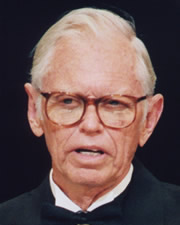Related Research Articles
APL is a programming language developed in the 1960s by Kenneth E. Iverson. Its central datatype is the multidimensional array. It uses a large range of special graphic symbols to represent most functions and operators, leading to very concise code. It has been an important influence on the development of concept modeling, spreadsheets, functional programming, and computer math packages. It has also inspired several other programming languages.
Computational linguistics is an interdisciplinary field concerned with the computational modelling of natural language, as well as the study of appropriate computational approaches to linguistic questions. In general, computational linguistics draws upon linguistics, computer science, artificial intelligence, mathematics, logic, philosophy, cognitive science, cognitive psychology, psycholinguistics, anthropology and neuroscience, among others.

Dennis MacAlistair Ritchie was an American computer scientist. He created the C programming language and, with long-time colleague Ken Thompson, the Unix operating system and B programming language. Ritchie and Thompson were awarded the Turing Award from the ACM in 1983, the Hamming Medal from the IEEE in 1990 and the National Medal of Technology from President Bill Clinton in 1999. Ritchie was the head of Lucent Technologies System Software Research Department when he retired in 2007. He was the "R" in K&R C, and commonly known by his username dmr.
In computer science, functional programming is a programming paradigm where programs are constructed by applying and composing functions. It is a declarative programming paradigm in which function definitions are trees of expressions that map values to other values, rather than a sequence of imperative statements which update the running state of the program.

Lysergic acid diethylamide (LSD), also known colloquially as acid, is a psychedelic drug. Effects typically include intensified thoughts, emotions, and sensory perception. At sufficiently high dosages LSD manifests primarily visual, as well as auditory, hallucinations. Dilated pupils, increased blood pressure, and increased body temperature are typical. Effects typically begin within half an hour and can last for up to 20 hours. LSD is also capable of causing mystical experiences and ego dissolution, albeit less frequently than compounds such as psilocybin. It is used mainly as a recreational drug or for spiritual reasons. LSD is both the prototypical psychedelic and one of the 'classical' psychedelics, being the psychedelics with the greatest scientific and cultural significance. LSD is typically either swallowed or held under the tongue. It is most often sold on blotter paper and less commonly as tablets or in gelatin squares.

The ACM A. M. Turing Award is an annual prize given by the Association for Computing Machinery (ACM) for contributions "of lasting and major technical importance to the computer field". It is generally recognized as the highest distinction in computer science and is known as or often referred to as the "Nobel Prize of Computing".
In computer engineering, a hardware description language (HDL) is a specialized computer language used to describe the structure and behavior of electronic circuits, and most commonly, digital logic circuits.
In programming language theory, semantics is the field concerned with the rigorous mathematical study of the meaning of programming languages. It does so by evaluating the meaning of syntactically valid strings defined by a specific programming language, showing the computation involved. In such a case that the evaluation would be of syntactically invalid strings, the result would be non-computation. Semantics describes the processes a computer follows when executing a program in that specific language. This can be shown by describing the relationship between the input and output of a program, or an explanation of how the program will be executed on a certain platform, hence creating a model of computation.

Peter Norvig is an American computer scientist and Distinguished Education Fellow at the Stanford Institute for Human-Centered AI. He previously served as a director of research and search quality at Google. Norvig is the co-author with Stuart J. Russell of the most popular textbook in the field of AI: Artificial Intelligence: A Modern Approach used in more than 1,500 universities in 135 countries.

LLVM is a set of compiler and toolchain technologies, which can be used to develop a front end for any programming language and a back end for any instruction set architecture. LLVM is designed around a language-independent intermediate representation (IR) that serves as a portable, high-level assembly language that can be optimized with a variety of transformations over multiple passes.

SAS is a statistical software suite developed by SAS Institute for data management, advanced analytics, multivariate analysis, business intelligence, criminal investigation, and predictive analytics.
The actor model in computer science is a mathematical model of concurrent computation that treats actor as the universal primitive of concurrent computation. In response to a message it receives, an actor can: make local decisions, create more actors, send more messages, and determine how to respond to the next message received. Actors may modify their own private state, but can only affect each other indirectly through messaging.

Matthias Felleisen is a German-American computer science professor and author. He grew up in Germany and immigrated to the US when he was 21 years old. He received his PhD from Indiana University under the direction of Daniel P. Friedman.

William Wesley Peterson was an American mathematician and computer scientist. He was best known for designing the cyclic redundancy check (CRC), for which research he was awarded the Japan Prize in 1999.
LSE is a programming language developed at Supélec and Télémécanique from the late 1960s to the mid 1970s.It is similar to BASIC, except with French-language instead of English-language keywords. It was derived from an earlier language called LSD, also developed at Supélec. It is most commonly said to be an acronym for Langage Symbolique d'Enseignement, but other expansions are also known.

Education in Niger, as in other nations in the Sahelian region of Africa, faces challenges due to poverty and poor access to schools. Although education is compulsory between the ages of seven and fifteen, with primary and secondary school leading into optional higher education, Niger has one of the lowest literacy rates in the world. With assistance from external organizations, Niger has been pursuing educational improvement, reforming how schools utilize languages of instruction, and exploring how the system can close gender gaps in retention and learning.

Carl Eddie Hewitt is an American computer scientist who designed the Planner programming language for automated planning and the actor model of concurrent computation, which have been influential in the development of logic, functional and object-oriented programming. Planner was the first programming language based on procedural plans invoked using pattern-directed invocation from assertions and goals. The actor model influenced the development of the Scheme programming language, the π-calculus, and served as an inspiration for several other programming languages.

Michael Ralph Stonebraker is a computer scientist specializing in database systems. Through a series of academic prototypes and commercial startups, Stonebraker's research and products are central to many relational databases. He is also the founder of many database companies, including Ingres Corporation, Illustra, Paradigm4, StreamBase Systems, Tamr, Vertica and VoltDB, and served as chief technical officer of Informix. For his contributions to database research, Stonebraker received the 2014 Turing Award, often described as "the Nobel Prize for computing."

Kenneth Lane Thompson is an American pioneer of computer science. Thompson worked at Bell Labs for most of his career where he designed and implemented the original Unix operating system. He also invented the B programming language, the direct predecessor to the C programming language, and was one of the creators and early developers of the Plan 9 operating system. Since 2006, Thompson has worked at Google, where he co-developed the Go programming language.
Thoth is a real-time, message passing operating system (OS) developed at the University of Waterloo in Waterloo, Ontario Canada.
References
- ↑ Bergeron, R. Daniel; Gannon, John D.; van Dam, Andries (1971). "Language for Systems Development": 50–72. doi:10.1145/800234.807060.
{{cite journal}}: Cite journal requires|journal=(help) - ↑ "LSD(ID:3109/lsd001)". HOPL: an interactive Roster of Programming Languages. Murdoch University. Archived from the original on 11 March 2011. Retrieved 7 April 2011.